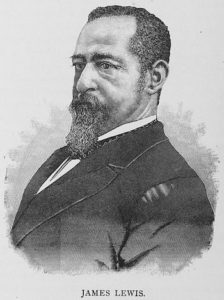
James Lewis, 1887
*The birth of James Lewis is celebrated on this date in 1832. He was a Black soldier and Republican Party politician in Louisiana.
James Lewis was born into slavery in Wilkinson County, Mississippi. His father was a white planter, his master, and his mother was an enslaved mulatto woman. He was raised in Bayou Sara, Louisiana. Before the American Civil War, Lewis worked on steamboats on the Mississippi River, including the steamboat Ingomar, where he served and formed a friendship with Robert Reed Church; he also befriended Norris Wright Cuney by steamboat work. All three became political leaders after the War.
At the beginning of the War, Lewis served as a steward on the CSS De Soto and was present at the fighting at the Battle of Belmont in November 1861 and the Battle of Island Number Ten and New Madrid in February, March, and April 1862. Lewis believed the war was a chance to fight for the freedom of all blacks. He fled through danger to New Orleans shortly after its capture by Union Forces under David Farragut and Benjamin Butler in late April and early May 1862 to join Union forces. In New Orleans, Lewis resolved to become a soldier. Together with other blacks, he was mustered into the 1st Louisiana Volunteer Native Guards as captain of one of these, Company K. While a minority of the members had been free men of color before the war, most troops were slaves newly freed by their escape from plantations and joining Union lines.
In 1864 Lewis married Josephine Joubert of New Orleans, a free woman of color whose family had been slaveholders. The couple lived in a fine house on Canal Street across from Straight University for many years. In November 1864, Lewis was authorized to recruit another infantry company to join the 1st United States Colored Infantry. He offered to do so if allowed to appear before a Board of Examiners and be commissioned as an officer. There he helped organize the First Louisiana Volunteer Native Guards, becoming captain of Company K and serving until 1864.
After the war, he became politically active in the Republican Party during Reconstruction. He was an ally of several other leading men of color in the city and state. This was an especially violent time in Louisiana and New Orleans politics, but Lewis survived for decades as a political leader. He initially worked for the Freedmen's Bureau and worked to establish schools for freed slaves throughout Louisiana. He was frequently threatened during his work by ex-Confederates who opposed his efforts. At one point, he was captured in North Louisiana and risked death but was rescued by the intervention of a group of fellow Freemasons. He may have been one of the injured in the 1866 New Orleans riot at the Mechanics Institute when whites rioted against a parade of blacks celebrating suffrage.
When the Freedmen's Bureau closed, Lewis was appointed as the United States inspector of customs for Louisiana, making him the first black man to have a civil position in the Federal service in the state. In 1869, Lewis became sergeant of the Metropolitan Police in New Orleans. He was successful, and in 1870, Governor Henry Clay Warmouth appointed Lewis as colonel of the Second Regiment of the State Militia. Support for Warmouth among black Louisiana Republicans flagged, and opposition to Warmouth coalesced in the Custom House Ring. It was headquartered at the U. S. Customs House. It was led by federal appointees, including Lewis, Stephen B. Packard, a US Marshal, James F. Casey, Collector of the Port of New Orleans, and brother-in-law to President Ulysses S. Grant. The Custom House Ring supported the gubernatorial bid of Speaker of the Louisiana House of Representatives George W. Carter, and Carter and Warmouth violently clashed in late 1871 and early 1872. James Longstreet was the head of the Louisiana state militia and was called to defend the statehouse from an attempt by Carter and the Ring to take over the government.
Lewis did not respond to Longstreet's call-up of the militia. Members of his unit were reorganized under more politically reliable officers and did play a role in supporting Warmouth. In the 1890s and early 1900s, Lewis and Walter L. Cohen were the most important political proponents of moderation in race issues. Lewis was a member of the National Afro-American Council. In 1898, Lewis actively supported black troops being included in the forces sent into the Spanish–American War. Lewis continued to be involved in politics, although the Republican Party was increasingly hampered in the state. By 1898, the political tides had shifted. Lewis supported the Warmouth wing in an atmosphere of Democrats conducting extreme vote suppression of Blacks.
Lewis was described as having "the peculiar charm of the gentleman of the old school" although more "French than Southern Gentleman." His son, James Lewis Jr., was an active New Orleans black elite member. His daughter, Julia (Lewis) Nickerson (c. 1878 – December 7, 1908), was a violinist and cellist in her husband, William J. Nickerson's orchestra. James Lewis died in New Orleans on July 11, 1914.